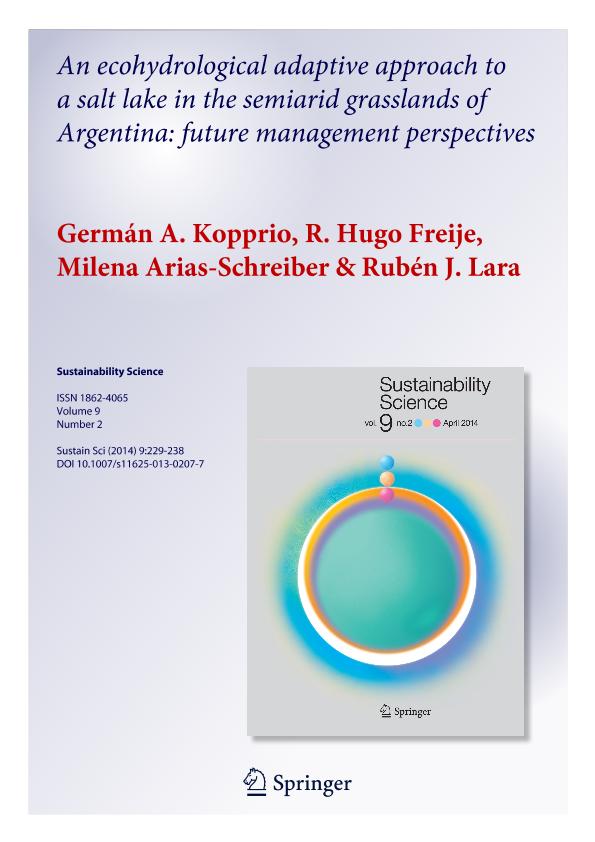Mostrar el registro sencillo del ítem
dc.contributor.author
Kopprio, Germán Adolfo

dc.contributor.author
Freije, Rubén Hugo

dc.contributor.author
Arias Schreiber, Milena
dc.contributor.author
Lara, Ruben Jose

dc.date.available
2017-01-16T18:39:29Z
dc.date.issued
2014-04
dc.identifier.citation
Kopprio, Germán Adolfo; Freije, Rubén Hugo; Arias Schreiber, Milena; Lara, Ruben Jose; An ecohydrological adaptive approach to a salt lake in the semiarid grasslands of Argentina: future management perspectives; Springer Tokyo; Sustainability Science; 9; 2; 4-2014; 229-238
dc.identifier.issn
1862-4065
dc.identifier.uri
http://hdl.handle.net/11336/11392
dc.description.abstract
Past extreme hydrological events, future climate change scenarios and approaches for lake management were studied in the Argentinean Pampa. Anthropogenic climate change will impact water bodies and create enormous challenges for water management. Adaptation strategies are needed urgently to deal with the uncertainties originated by climate change on inland or coastal basins. Only a few studies have addressed practical strategies to mitigate global change impacts on lakes and practically none in South America. The purpose of this work was to discuss management options and seek better adaptive alternatives for the nature reserve Lake Chasicó, and to propose future management experiments and actions at a regional level. The ecohydrological approach is likely to increase the ecological resilience of the lake, dampen climate-driven hydrological variations and reduce eutrophication problems. Future projects should include wetland creation, fish management, water quality control, engineering work studies and education programs. Ecohydrology as an integrative natural science should be considered as a water management strategy to build ecological resilience into water bodies. The building of social-ecological resilience is also crucial for the stability of coupled human-ecological systems. The integration of natural and social sciences into sustainability approaches represents a robust strategy for adapting to climate change.
dc.format
application/pdf
dc.language.iso
eng
dc.publisher
Springer Tokyo

dc.rights
info:eu-repo/semantics/openAccess
dc.rights.uri
https://creativecommons.org/licenses/by-nc-sa/2.5/ar/
dc.subject
Climate Change
dc.subject
Eutrophication
dc.subject
Ecohydrology
dc.subject
Salt Lake
dc.subject.classification
Oceanografía, Hidrología, Recursos Hídricos

dc.subject.classification
Ciencias de la Tierra y relacionadas con el Medio Ambiente

dc.subject.classification
CIENCIAS NATURALES Y EXACTAS

dc.title
An ecohydrological adaptive approach to a salt lake in the semiarid grasslands of Argentina: future management perspectives
dc.type
info:eu-repo/semantics/article
dc.type
info:ar-repo/semantics/artículo
dc.type
info:eu-repo/semantics/publishedVersion
dc.date.updated
2016-12-01T19:39:41Z
dc.journal.volume
9
dc.journal.number
2
dc.journal.pagination
229-238
dc.journal.pais
Japón

dc.journal.ciudad
Tokyo
dc.description.fil
Fil: Kopprio, Germán Adolfo. Consejo Nacional de Investigaciones Científicas y Técnicas. Centro Científico Tecnológico Bahía Blanca. Instituto Argentino de Oceanografía (i); Argentina. Osaka Prefecture University; Japón
dc.description.fil
Fil: Freije, Rubén Hugo. Universidad Nacional del Sur; Argentina
dc.description.fil
Fil: Arias Schreiber, Milena. Leibniz Centre For Tropical Marine Ecology; Alemania
dc.description.fil
Fil: Lara, Ruben Jose. Consejo Nacional de Investigaciones Científicas y Técnicas. Centro Científico Tecnológico Bahía Blanca. Instituto Argentino de Oceanografía (i); Argentina. Leibniz Center for Tropical Marine Ecology; Alemania
dc.journal.title
Sustainability Science

dc.relation.alternativeid
info:eu-repo/semantics/altIdentifier/url/http://link.springer.com/article/10.1007/s11625-013-0207-7
dc.relation.alternativeid
info:eu-repo/semantics/altIdentifier/url/http://dx.doi.org/10.1007/s11625-013-0207-7
Archivos asociados
